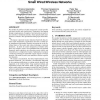70 search results - page 12 / 14 » Charge-Sensitive TCP and Rate Control in the Internet |
INFOCOM
2000
IEEE
15 years 3 months ago
2000
IEEE
— End-to-end congestion control mechanisms such as those in TCP are not enough to prevent congestion collapse in the Internet (for starters, not all applications might be willing...
CN
2010
14 years 11 months ago
2010
Most existing criteria [3], [5], [8] for sizing router buffers rely on explicit formulation of the relationship between buffer size and characteristics of Internet traffic. However...
ICNP
2007
IEEE
15 years 5 months ago
2007
IEEE
— Congestion caused by a large number of interacting TCP flows at a bottleneck network link is different from that caused by a lesser number of flows sending large amounts of d...
FPL
2005
Springer
15 years 5 months ago
2005
Springer
A hardware-accelerated algorithm has been designed to automatically identify the primary languages used in documents transferred over the Internet. The algorithm has been implemen...
110
click to vote
CONEXT
2009
ACM
15 years 18 days ago
2009
ACM
We consider the problem of traffic management in small networks with both wireless and wired devices, connected to the Internet through a single gateway. Examples of such networks...

